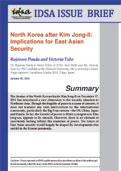North Korea after Kim Jong-Il: Implications for East Asian Security
 The demise of the North Korean leader Kim Jong-Il on December 17, 2011 has introduced a new dimension to the security situation in Northeast Asia. Though the fragility of peace is a cause of concern, it does not warrant any rash intervention by the international community, particularly the Big Four nations – the US, China, Japan and Russia. So far, the transfer of power to Kim’s youngest son, Kim Jong-un, appears to be smooth. However, there is an element of uncertainty lurking behind this transition of power. The future of East Asian security would largely be shaped by developments that unfold in the Korean peninsula.
The demise of the North Korean leader Kim Jong-Il on December 17, 2011 has introduced a new dimension to the security situation in Northeast Asia. Though the fragility of peace is a cause of concern, it does not warrant any rash intervention by the international community, particularly the Big Four nations – the US, China, Japan and Russia. So far, the transfer of power to Kim’s youngest son, Kim Jong-un, appears to be smooth. However, there is an element of uncertainty lurking behind this transition of power. The future of East Asian security would largely be shaped by developments that unfold in the Korean peninsula.
Download Issue Brief
Keywords: North Korea







